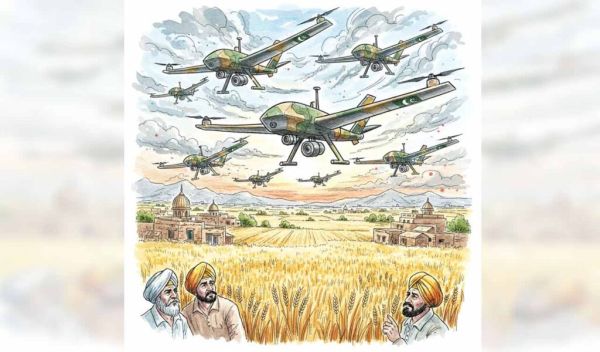
The proliferation of drones and the merging of drug and arms cartels along Punjab’s border signal a dangerous revival of Pakistan’s covert tactics
Published Date – 17 October 2025, 10:42 PM
It is no secret that Pakistan has been employing all possible methods to create trouble in India as part of its long-term military strategy to weaken its neighbour with a thousand cuts. Deploying drones to smuggle drugs and weapons across the border has recently become part of its lethal toolkit. There was a brief lull in drone intrusions from across the border during ‘Operation Sindoor’, but Pakistani smugglers have now returned with new tactics, pushing drones deep into Indian territory with deadly accuracy. In the past, the air-dropping of drugs, arms and ammunition took place very close to the international border, but now drones are coming 2 to 3 km inside Indian territory. This is a dangerous trend that needs to be neutralised. Several drones transporting drugs, explosives, weapons, and money have been caught in the region by security forces over the last few years. Punjab, being a border State, bears the brunt of this drone offensive. The five-fold increase in arms smuggling along Punjab’s border signals a dangerous revival of Pakistan’s secret tactics. With 362 weapons seized so far this year, as against 81 last year, Punjab once again finds itself at the forefront of a covert conflict. Intelligence agencies associate this rise with ‘Operation Sindoor’, India’s targeted strikes on terror hideouts in Pakistan and Pakistan-occupied Kashmir (PoK) earlier this year. The retaliation has come not through direct conflict but via drones and couriers transporting Glocks, AK-47s, and grenades into Punjab’s border districts.
The use of unarmed drones capable of delivering explosives has become a terrorist group’s dream, as it significantly alters the nature and dynamics of hybrid warfare. Despite clear evidence, Pakistan has long denied any involvement in facilitating cross-border terrorism. In the past two months alone, multiple crackdowns have exposed cross-border networks backed by Pakistan’s Inter-Services Intelligence. Each seizure underscores how swiftly the line between organised crime and terrorism is blurring. Handlers operating from across the border use a web of gangsters and drug smugglers to deliver weapons and narcotics. While the Punjab police have shown commendable coordination with Central agencies in intercepting these consignments, the magnitude of the recoveries suggests that what is being caught is only a fraction of what slips through. This is not just a law-and-order issue. It is hybrid warfare — an assault on Punjab’s internal stability and India’s national security through proxies and technology. A concerted national response — backed by technology, intelligence, and political will — is the only firewall against this infiltration. A strong, comprehensive policy is essential to counter the drone menace. The proliferation of drones and the merging of drug and arms cartels demand an upgraded border doctrine: real-time surveillance, AI-based interdiction systems and enhanced community intelligence. The Centre, which is spearheading the nation’s war on drugs, should leave no stone unturned in exposing Pakistan on international platforms over its complicity in promoting narco-terror.